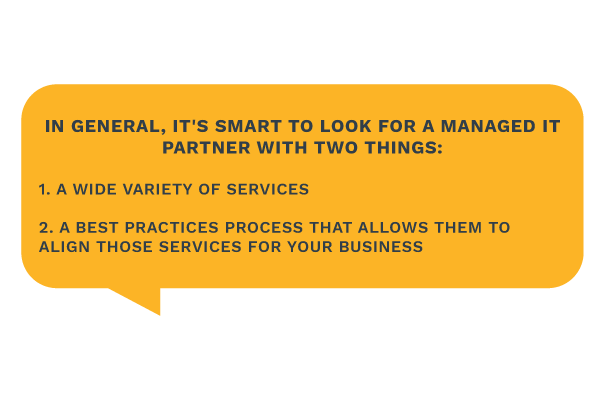When it comes to outsourcing IT functions, there's a misconception that an SMB (small and medium-sized business) is prevented by its small size from taking advantage of enterprise-level IT.
That's just not true.
Being technologically adept provides a competitive advantage, but handling increasingly complex IT systems is a challenge. A managed IT partner can help, alleviating the stress of managing your network, security, data backup, and more. Contrary to popular belief, this isn’t a luxury only available to larger businesses; there are many managed IT partners who specialize in meeting the IT needs of SMBs.

Let's explore the reasons why you aren't too small to outsource some (or all) of your IT, including your network security. But first, let's explain managed IT.
What Is Managed IT Exactly?
Managed IT is a way to source the information technology infrastructure you need by outsourcing with a third-party provider. Think of it as the business version of Apple's old ads, “there's an app for that.”
Need someone to manage your network? There's a managed IT partner for that. Need someone to outsource your security needs to? There's a managed IT partner for that.
A managed IT partner, often also referred to as a managed services provider (MSP) can supplement your existing IT department (or even become your IT department). The exact services provided by the managed IT partner depends on the established agreement, but here are just a few examples:
- Network management and security
- IT help desk support
- Data backup and recovery
- Email security and hosting
- Virtual CIO
- Vendor management
- Proactive monitoring and maintenance
- Strategic IT planning
This is not an exhaustive list. These services can be used individually or as a bundle. The important thing is that your managed IT partner will handle all IT responsibilities, giving you greater peace of mind and allowing you to focus on developing your core competencies.

The last thing you need is a company trying to shoehorn you into an outsourced service package because that's what they do, not because it's a good fit for you. A managed IT partner with a broader services portfolio will be able to tailor a solution to fit your business needs.
Why Should I Outsource IT?
Need some more convincing? Here are a few reasons you should consider outsourcing IT:
Proactive, Not Reactive
Your managed IT partner won’t just fix problems, but identify them before they surface by monitoring your systems. It’s a much better idea to prevent a problem from occurring in the first place than to deal with the consequences.
Strategic Thinking
Part of being proactive is thinking long-term. Your managed IT partner will help you consider what IT systems and services you may need in the future. They will help you plan ahead and align your IT infrastructure to best achieve your business goals.
Minimizes Risk
All businesses have calculated risks, from big corporations to small mom and pop shops. Why not decrease some of this risk by outsourcing your IT department? While your employees are focusing on matters pertaining to the company, an outsourced IT service has one job: maintaining the safety of your business.
Efficiency
Not only are the services provided by the managed services cheaper, but more efficient and convenient as well. Managed IT services offer on the go help. They are always one call or click away, regardless of the time or day. With a wide range of competencies, proficient managed IT partners can easily handle any problem that arises.
Reliability
You can trust that your managed IT partner will do their best to reduce the quantity of problems your business faces and implement preventative measures. This is because the more IT-related issues you face, the more time, energy and resources your managed IT partner will have to devote to fix them. The nature of this business relationship means your goals are aligned with those of your managed IT partner.

Like Mowing Your Lawn
A Managed IT provider has the critical mass to hire the necessary IT expertise and IT infrastructure to provide services to businesses, regardless of their size.
Think of it like mowing your lawn. You could mow your lawn yourself – buy the lawnmower, find somewhere to store it, keep it gassed up (or plugged in to charge) and maintained, and then take the time to either walk or ride back and forth to cut your lawn. You’ll need a weed trimmer and edger too.
A lawn company will pull up in a truck and trailer, zip around on their high-speed, large width mowers, and finish cutting your lawn (and your three neighbors' lawns) in the time it takes you to finish half your lawn. Someone else has also done the edging and blown all the grass off your driveway and sidewalk. All you have to do is write a check and enjoy your day.
Managed IT providers already have a critical mass of IT and trained personnel in place. Thus, they are able to offer IT solutions at a lower price than an individual business would pay to put all of the pieces together themselves – staff, office space, and IT infrastructure.
You Aren't Too Small
Believe it or not, managed IT services are often designed for smaller companies. Many managed IT providers build their businesses around providing those services to SMBs.
![According to CompTIA's 5th Annual Trends in Managed Services, “[MSPs] typically serve small to medium-sized customers and/or individual departments within larger organizations.”](https://www.office1.com/hs-fs/hubfs/Blog%20Template/Blog%20Graphics/IT-Misconception-SMBs_4.png?width=600&name=IT-Misconception-SMBs_4.png)
In fact, most managed IT providers' goal is to serve the small business market. And SMBs are waking up to this fact. The managed services market is predicted to grow from $186 billion in 2019 to $356.24 billion by 2025. Similarly, a study by CompTIA found that 64% of businesses were using a managed IT provider for at least one operational function.
The need for managed services may actually be more pressing for an SMB than for larger businesses, for two reasons.
Firstly, technology is usually highly prioritized by SMBs. In a study on the technology buying trends of SMBs, approximately two thirds of SMBs identified technology as a primary aspect in pursuing their business goals. Similarly, the worldwide SMB spending on IT related services is expected to exceed $676 billion by 2021.
There is no denying the growth of both the importance of technology, and the amount of money dedicated to it by SMBs. This means the associated risks increase as well. Rather than gambling with such an important component of your business, trusting a competent managed services provider can take some of the weight off your shoulders.
Secondly, recently SMBs have been more at risk for cyberattacks than larger businesses. According to 4iQ’s 2019 Identity Breach Report, cybercriminals have shifted their focus towards small businesses, causing a 424% increase in SMB breaches from the previous year. We can’t emphasize enough how costly and damaging cyberattacks can be to a business, particularly SMBs. Paying particular attention to cybersecurity is a good idea, and the best way to do so is to hire an MSP, as they specialize in the protection of IT infrastructure.
Clearly size isn't an issue when outsourcing IT services. In fact, as an SMB, you're exactly the right size to benefit from the services that we and other managed IT companies offer.
Categories: Security, Office Hacks, DaaS, Managed Services











